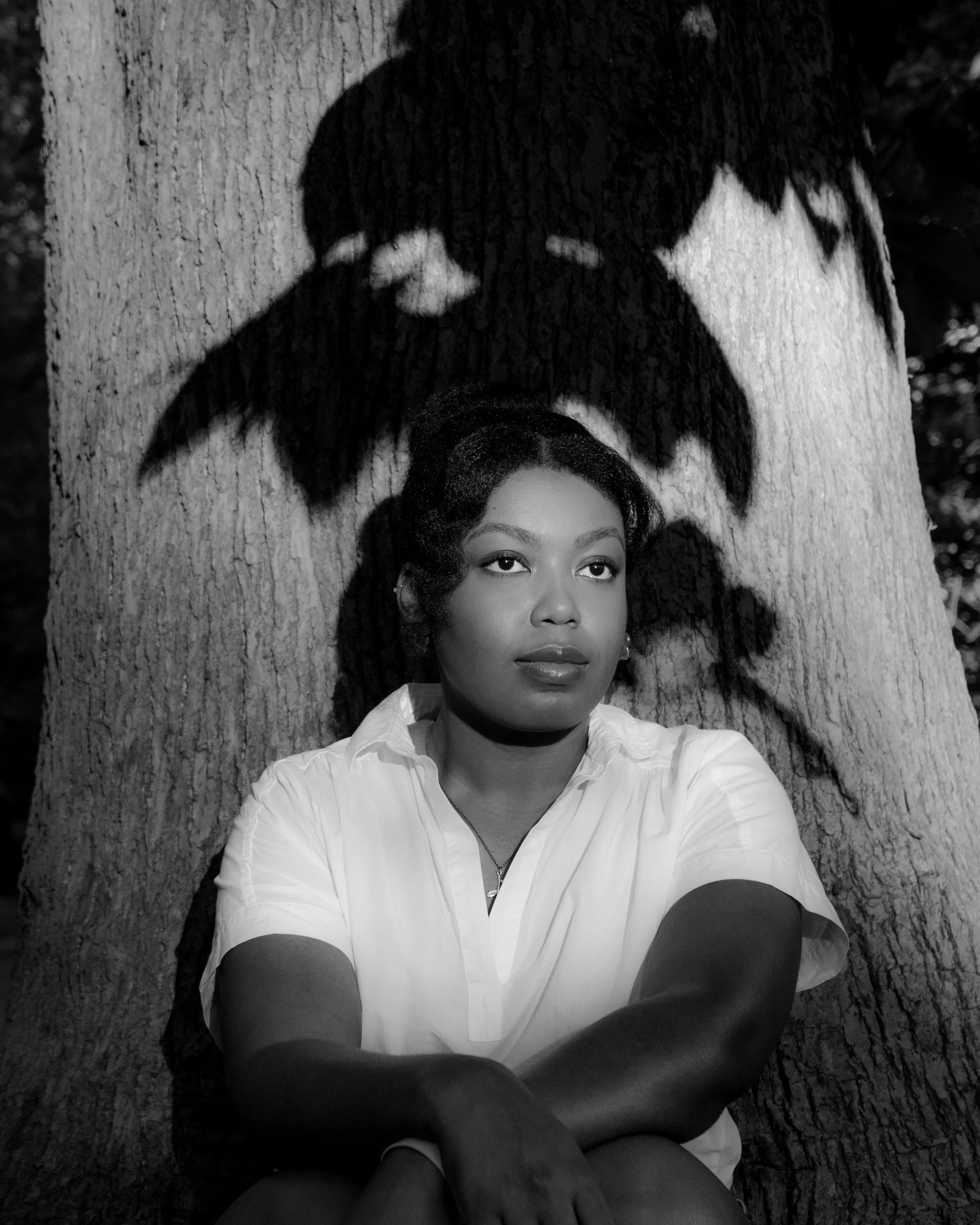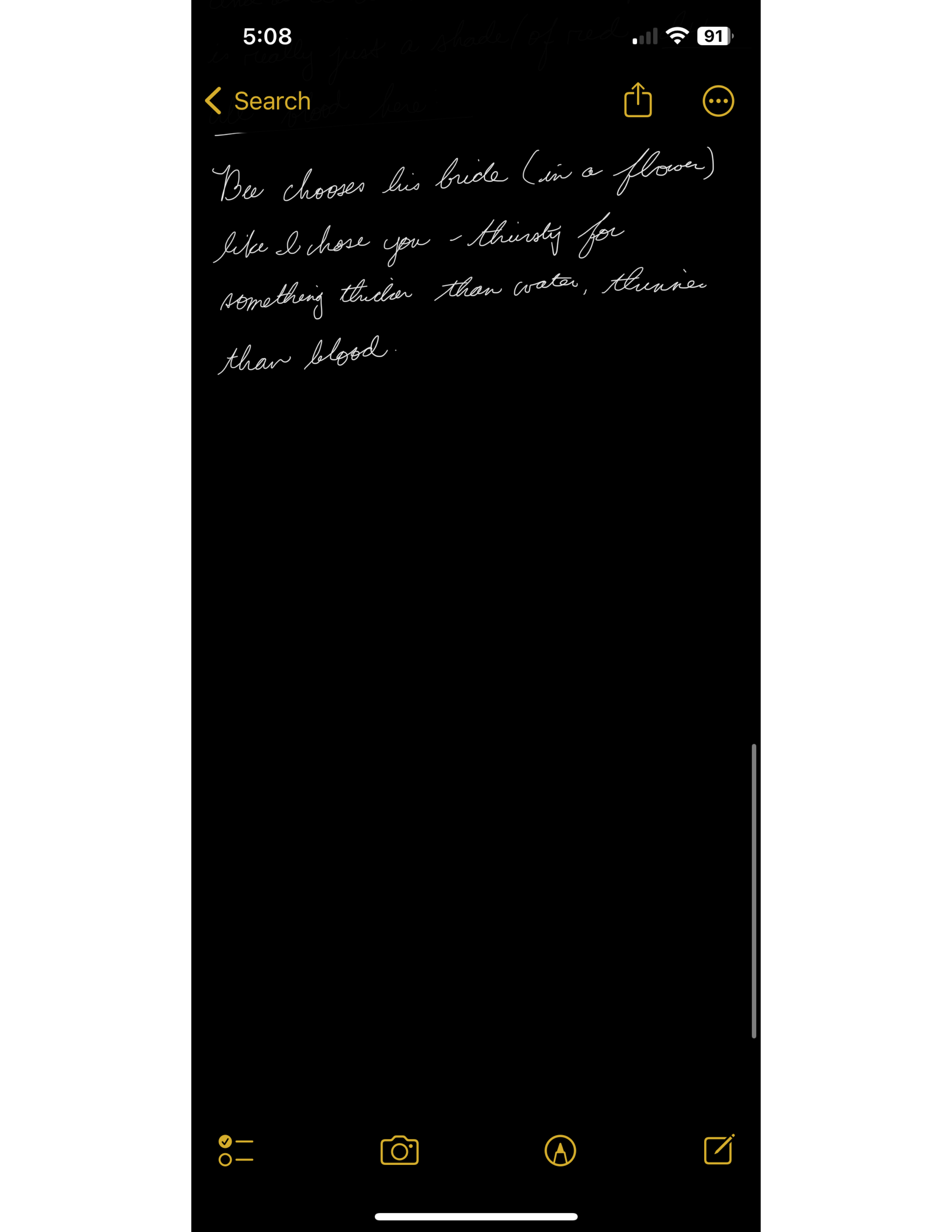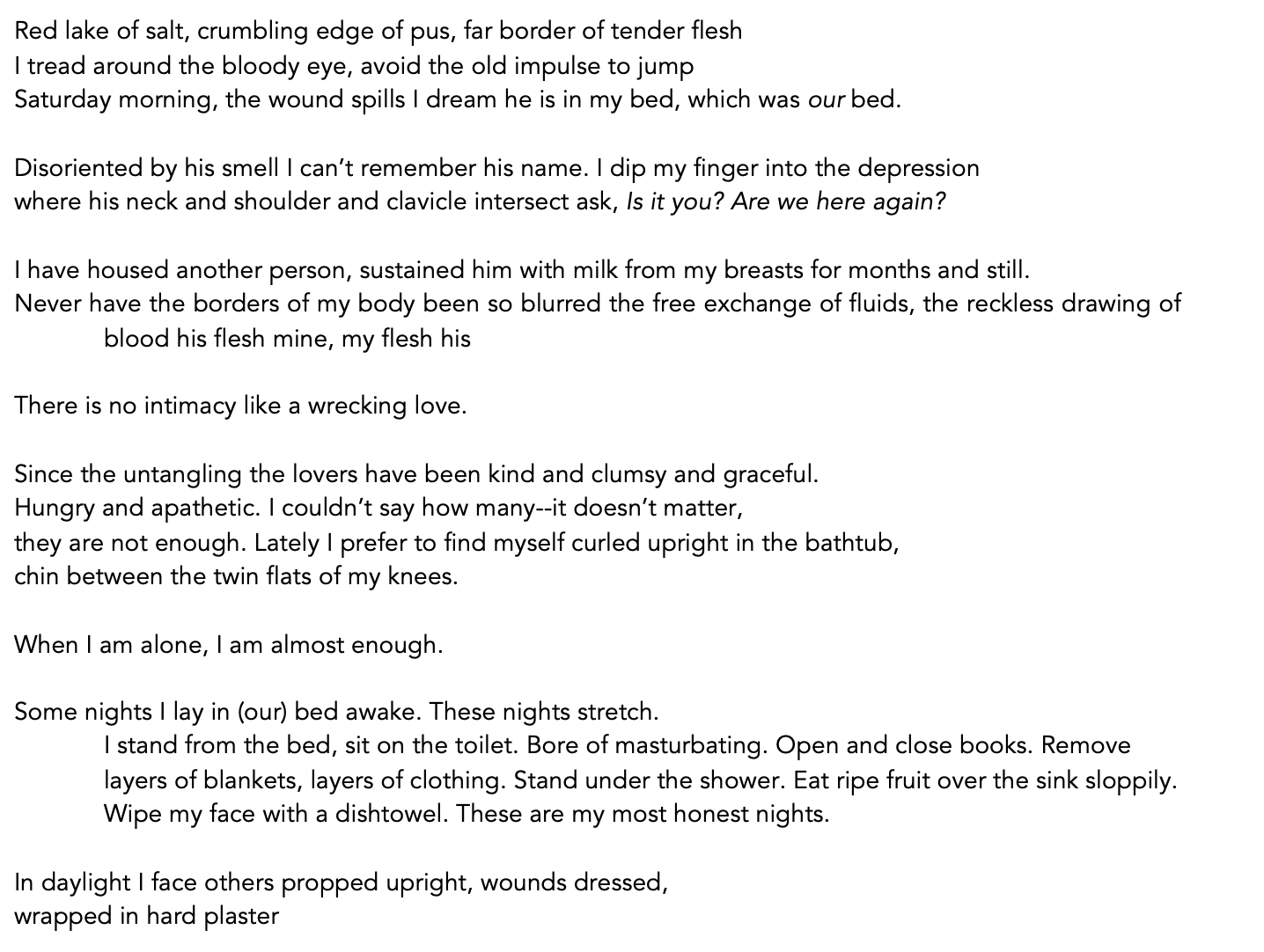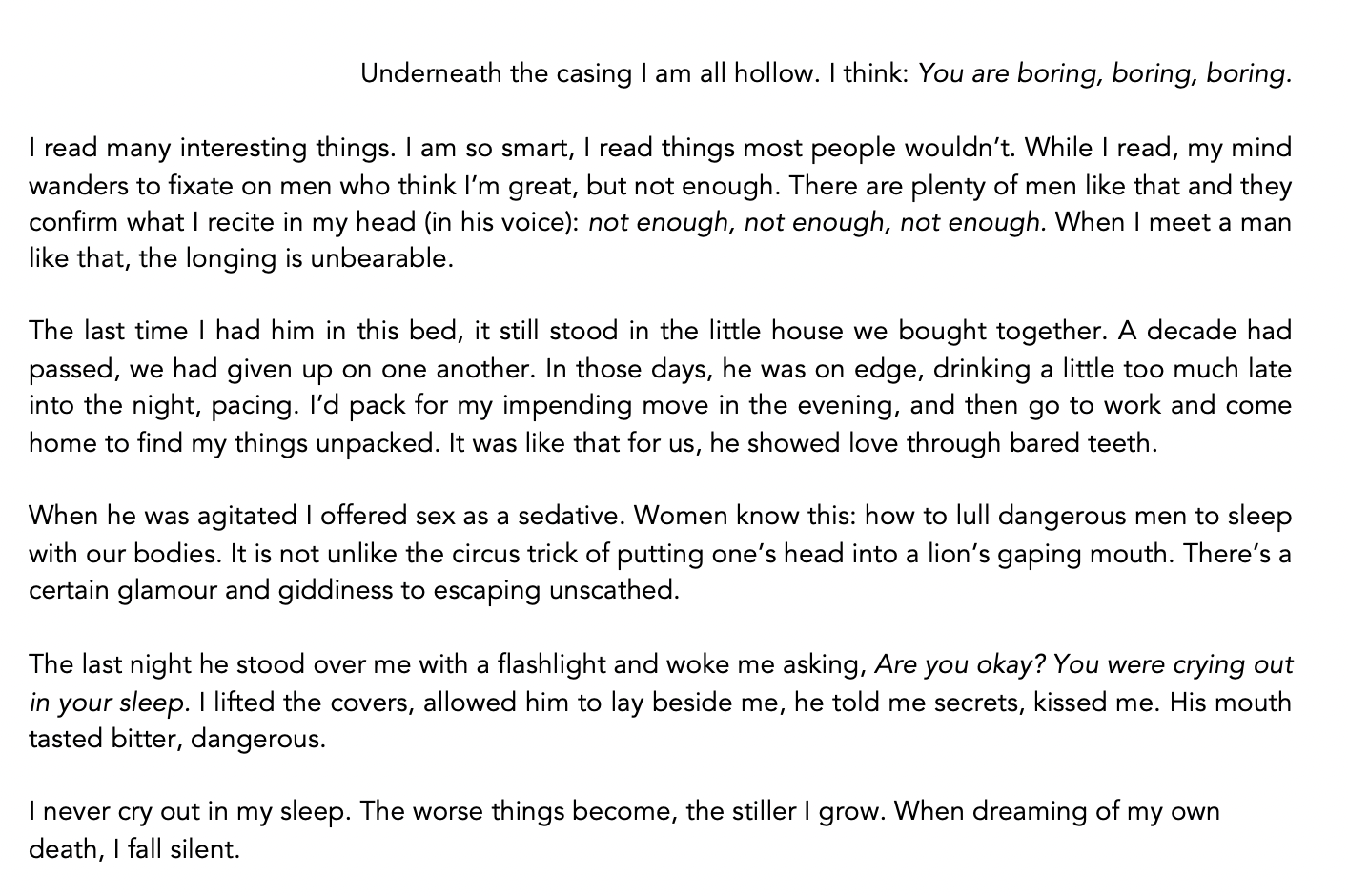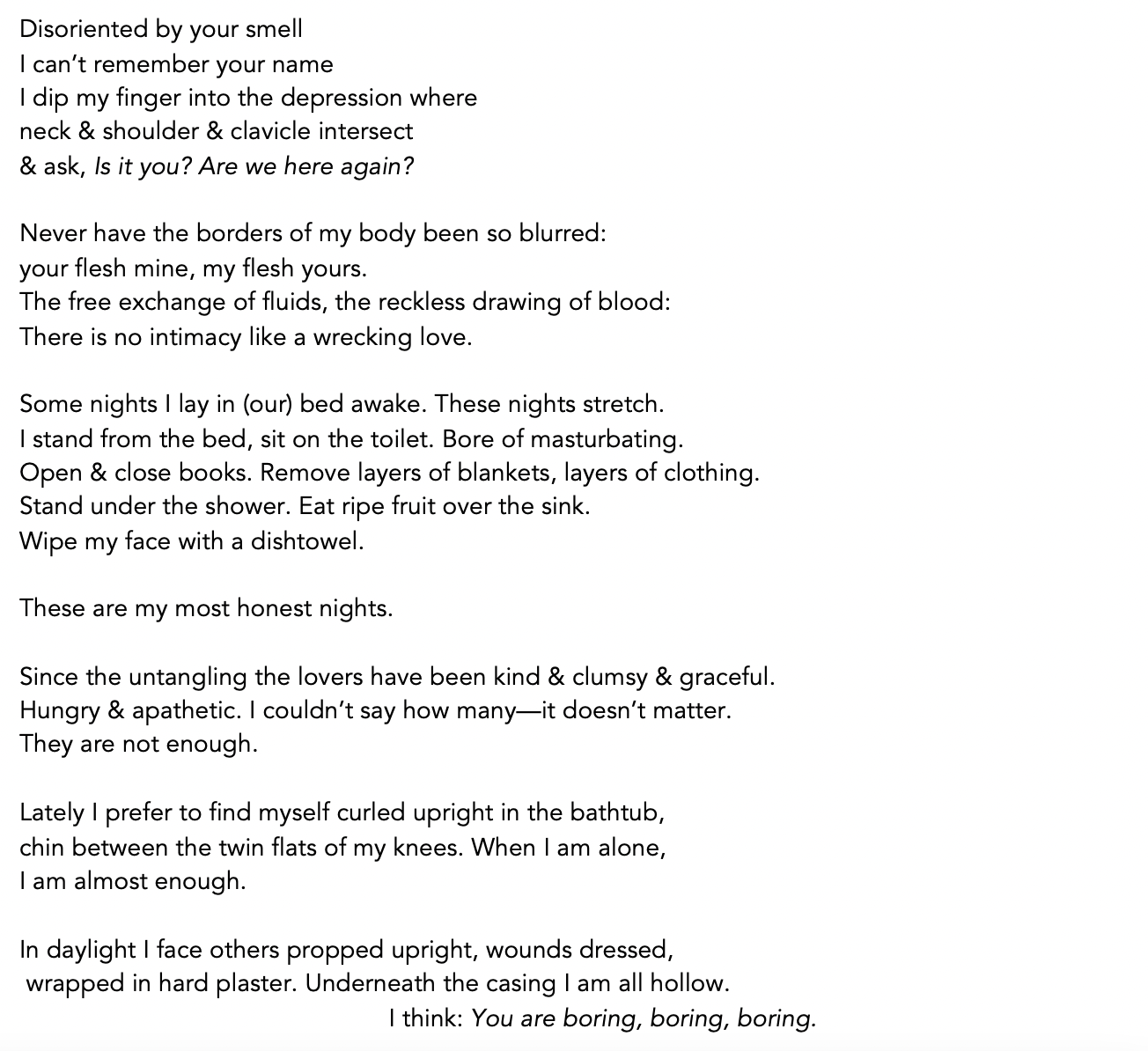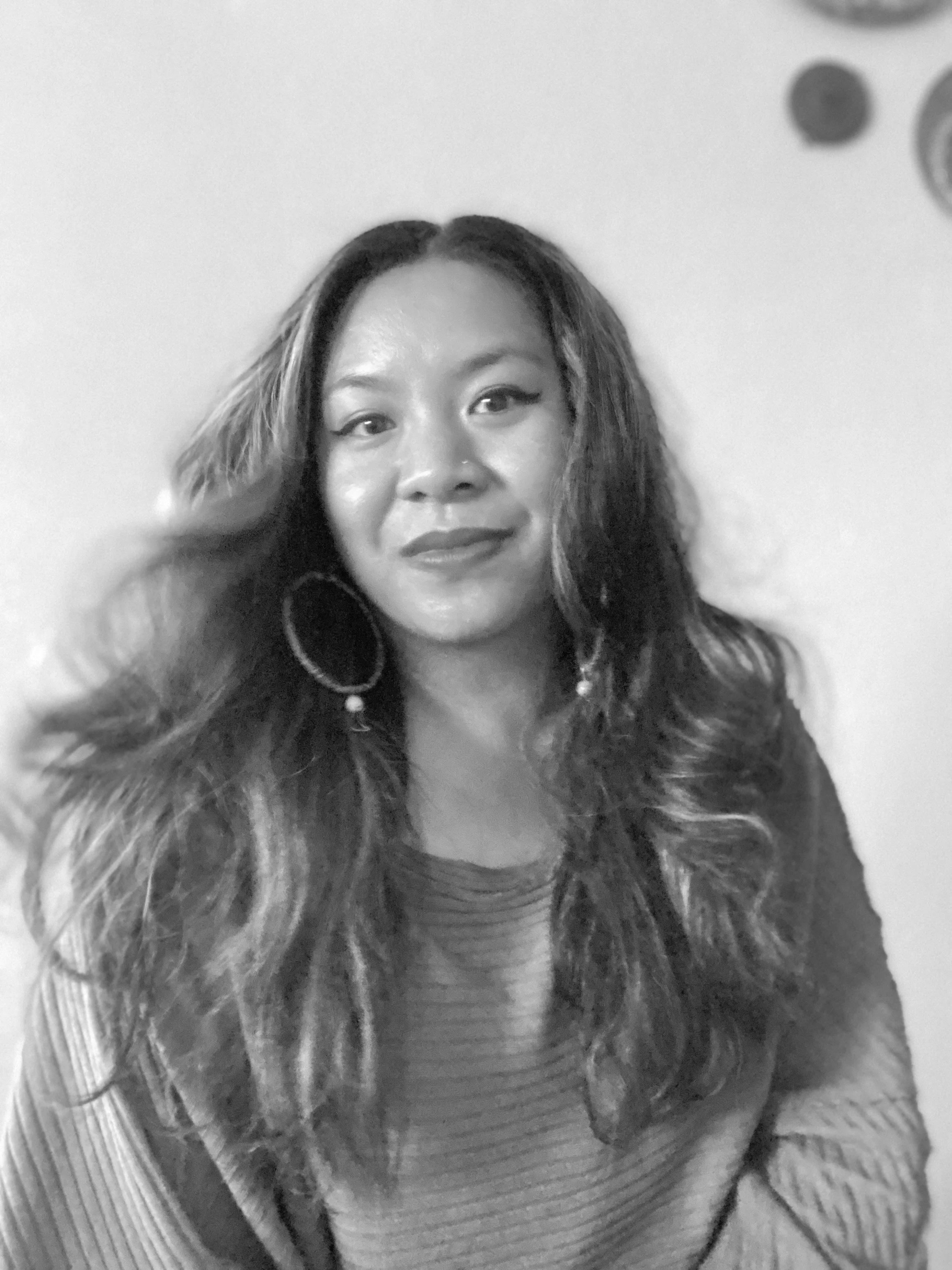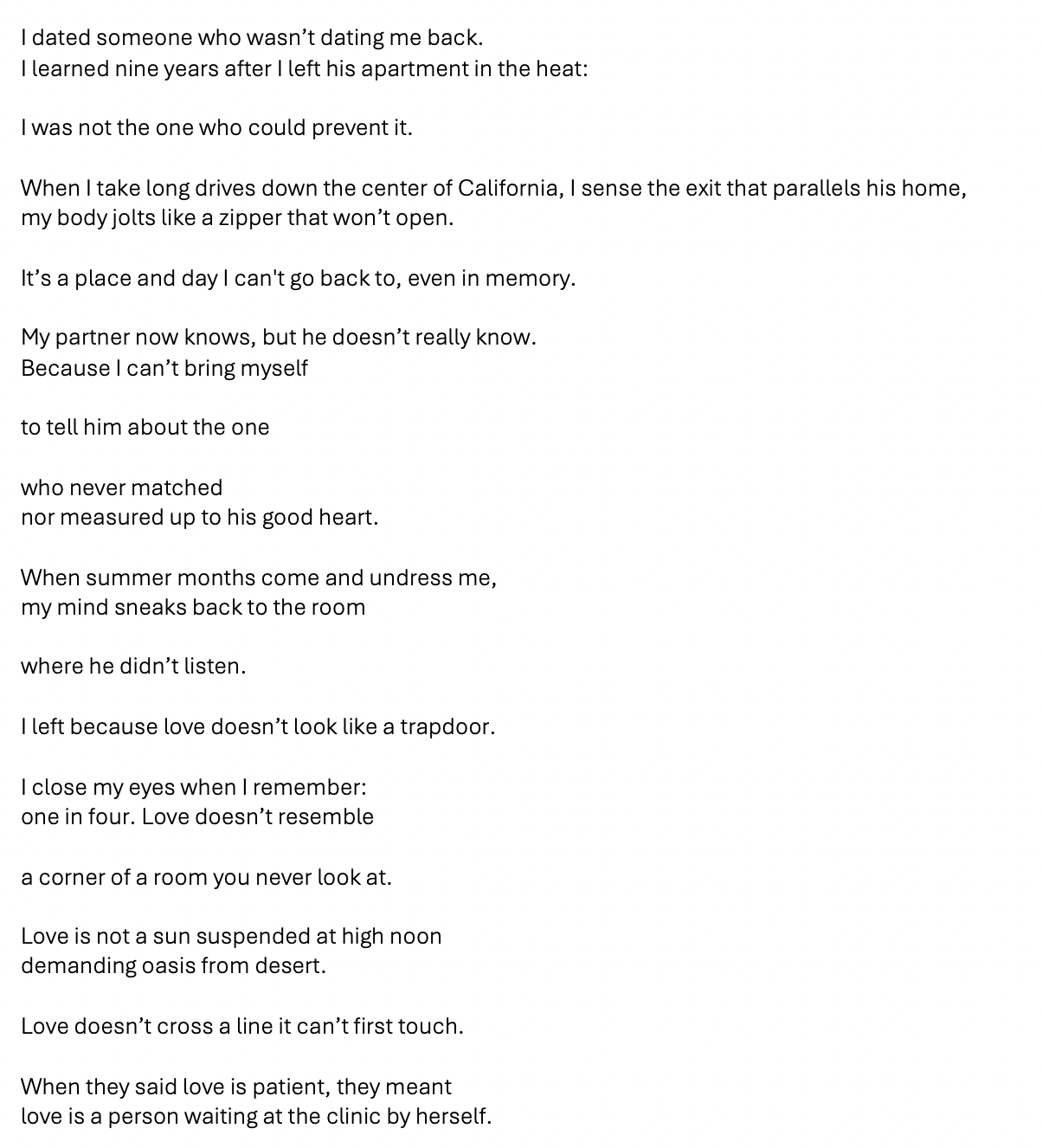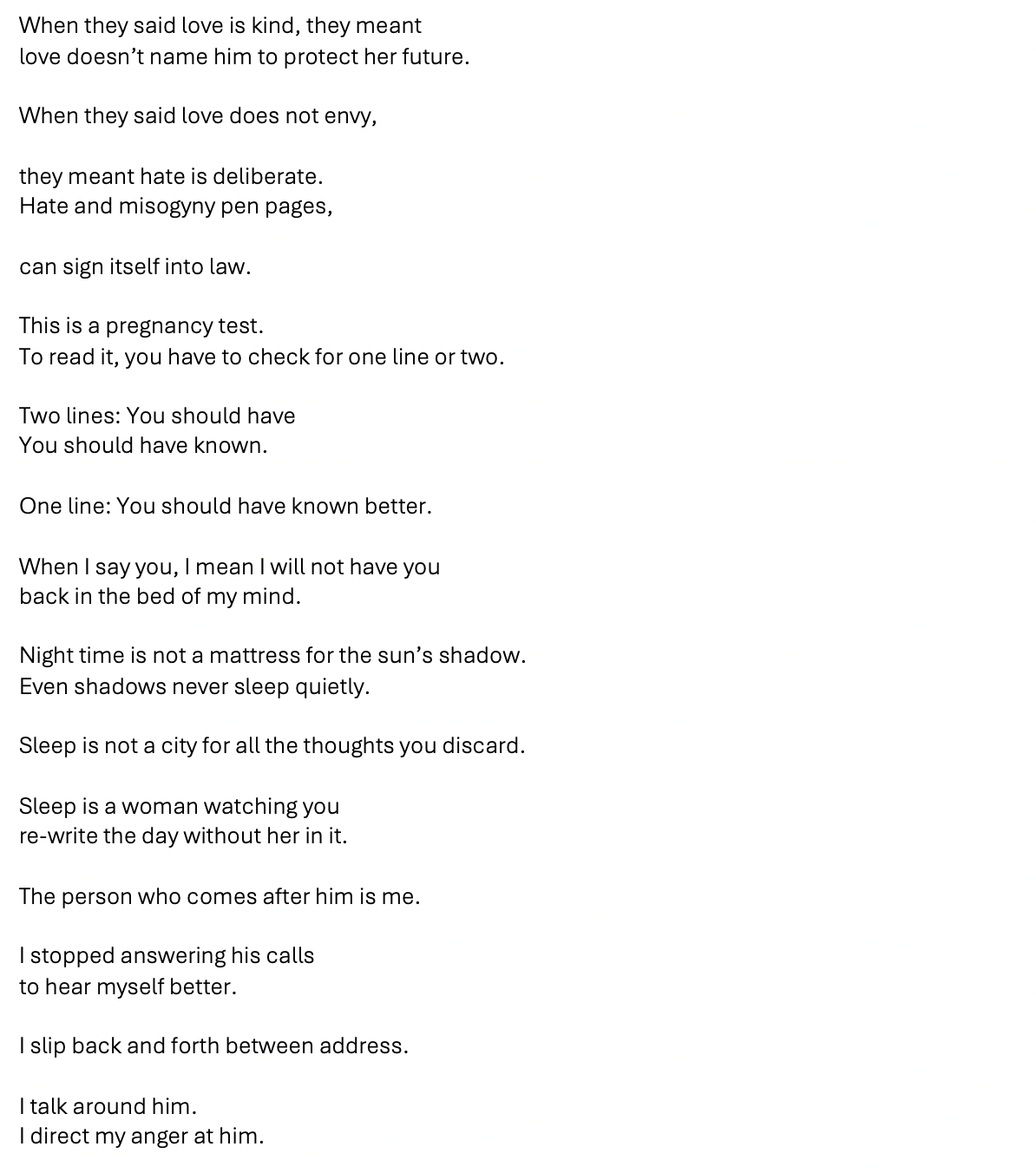Ariana Benson
This poem sprung from the same well as a suite of poems that appear in Black Pastoral, all with the same title—love poems that capture instances of Black intimacy across many fields and so much time. I felt frustration with this poem, unable to appreciate it for what it was, because it wasn’t what I wanted to be writing. I couldn’t leave the field (of mind) I’d entered to write the poems in the collection. So, I had no choice but to write until the ink of Black Pastoral’s pen ran dry, and to accept that this is part of the work and life cycle of the project. Our obsessions decide when they’re done with us, not the other way around.
There are a few moves in this draft that I make almost every time I approach the page. I use parentheses liberally when scratching out the first version—usually, they encircle a word that doesn’t yet strike the right note, sonically, affectively, or otherwise. I keep the first word that came to me, and try to keep my pen going, fearful of losing the momentum that is key to my getting anything on the page at all. Then, in the revision stage, “huddle” becomes “fever” because of the echoic long “e” with the shortly following “fieldmouse”; by the same token, I might realize a “curled” fits well, and drop the parentheses altogether.
Drafting by hand allows me to get the shape of an idea on the page, but revision is where I attune the words to an intangible flow and hum. The one “craft” element that I draft with attention to is the line break—if I see a place where enjambing a line may create a dual (and thus deepened) meaning, I’ll throw a quick slash into what would otherwise be a prose sentence. I also open and close the poem with “heart lines” that set up the concept of the poem, and also offer an emotional entryway. These come to me all on their own, and most of them live in my iPhone notes until I’m ready to make from their modest linguistic sketch, a fully textured poem.
< draft >
< draft >
Love Poem in the Black Field
Jamestown, Virginia, 1622
I have been looking for beautiful things / to hold alongside you in my mind:
The shimmer / of horseflies’ wings as they (huddle) over a dead fieldmouse,
The (rare) skin / of a Gala of which no worm has made meal or home.
These new (things called) honeybees, all buoyant with excitement at being
Let off the ship.
Found another dead one yesterday—whole, stinger and all, (curled) up
Under a tobacco leaf. I won’t step on them. Not because I’m scared
Of the sting. Because they ain’t so different than us—jarred in darkness,
Drug cross that (big pond), made to work under a new sun
So another man’s spit can taste sweet—that I can call burying
Them with my feet anything like mercy. We like the bees:
Buzzing, humming, drowning
Out everything but our own noise. I talk to you out here
Because I’ve seen what a monster all that silence makes of man. For you,
I make new my eyes. I speak to keep sugar on my lips.
Look at the flowers, they say, at the miracles of God. But if I don’t
Keep rose, cherry blossom, lily under my tongue, all I can do is think
About how pink is really just a (shade/kind) of red. In a flower,
A bee chooses his bride, as I choose you—still thirsting for a sip
of something thicker than water, thinner than blood.
< final version >
Love Poem in the Black Field
Jamestown, Virginia, 1622
I look for beautiful things to plant
Alongside you in my mind: the shimmer
Of horseflies’ wings as they fever
Over a rotting fieldmouse, the mist
settled over the waiting leaves.
These new things called honeybees,
All buoyant with excitement at being
Let off the ship. Found another dead one
Yesterday—whole, stinger and all, curled up
Under a tobacco leaf. I won’t step on it.
Not because I’m scared of the sting. Because they ain’t
So different than us—jarred in darkness,
Drug cross all that blue, made to labor
Under a vengeful sun so some man’s tongue taste
sweet—that I can call burying them underfoot
Anything like mercy. We like the bees:
Ruined, and so buzzing, humming, drowning
Out everything but our own noise.
I’ve seen the beast all that silence
Makes of man. For you, I speak,
Keep sugar on my lips. I open anew
My eyes. Look at the flowers, they say,
The miracles of God. and it’s all I can do
Not to think about how pink is no more
Than a thinner kind of red. In a flower, the bee takes
A kind of bride, as I choose you—thirsting
For a sip of something fuller than nectar,
lighter than blood.
Yesenia Montilla
When DMX died, it was a year into the pandemic. My father was dealing with his own health battles, and this video I came across of DMX on a coaster with his daughter reminded me that one of the things my dad loved to do with me as a kid was take me to Coney Island.
I had been thinking about how we can push the boundaries in poetry, not just in the poems themselves but in the definition of craft and labels. Example: here, I looked at this video as a work of art and thought what if I called this poem ekphrastic.
At first, I focused on description, really trying to capture the moment, but as I started to revise, I realized that, for me, the poem was about me and my dad. Both DMX and my father battled drug addiction. Both DMX and my father loved a good coaster and gathered their daughters protectively while wrapping them in appropriate dangers.
I started to play with the form of the poem first, to make it feel like free falling, like a coaster not only in the sound—shorter lines and soft v. hard sounds against one another—but also looking at the body of the poem on the page, the skinny drop of a line into another line into another. I wanted it to have some air in it, and some drops, like what a coaster provides. The sensation of being high, whether due to a coaster or drugs, needed to hold; that comparison was really important to me. I realized that when you have a parent who battles drug addiction, you too are battling drug addiction. As children we don’t know what safety is or how to trust when adults consistently let us down. The poem ends with trust and DMX’s voice, a father’s reassurance, his promise.
< draft 1 >
On the Day DMX Dies I Watch the Video of Him Riding a Coaster with His Daughter
Father’s and daughters
How they fit and sometimes
don’t
I watch as the sling clicks
into place
her side ponytail is truly
a vision
she whispers something to
him about not wanting to
his response I can’t make out
they take off
shoot into the sky like birds
she grabs his hand or he grabs hers
he gathers her
as they are flying,
birds without wings—
< final version >
On the Day DMX Dies I Watch the Video of Him Riding a Coaster with His Daughter
sling clicks into place
her side ponytail
a vision
she whispers
I don’t want to
he responds it’s too late
the sling takes off
shoots them into
the blue
nothing of
abandon
rewind:
even before that
she extends her hand & without
even looking he finds it
& gathers it
into his
as though her hand were
the last of the water for a
thirsty man
In air they are
flying,
catapulted
birds without wings
the unknowing of how
to
come
down
she screams
he
whispers
daddy’s got
you
daddy’s got
you —
Karisma Price
In school I was always told that I needed to split up the run-on sentences I’d write in my essays, and that “rule” carried over into my poetry writing. The first draft of “You’re Always so Serious” was very short. I wrote it in response to people telling me I had a mean resting face and that I always looked so serious (which is my right).
Terrance Hayes read the poem and told me it felt like I was stopping myself from saying all that I wanted to say and that I should lean into the instinct of writing those long, run-on sentences “just like the wrap around porch” in the poem. He was right. I did have more to say. I often think about real estate and living conditions, especially as someone who grew up poor.
St. Charles Ave boasts beautiful houses. Tourists go to see them and take photos, but that area and Audubon Park used to be a sugar plantation, and many of those houses have antebellum style architecture that make me uncomfortable because of the violent history of slavery. I wanted the poem to feel like an anxiety-induced dream, unconfined to real-world logic.
The final draft is a result of leaning into my natural inclination to not stop a sentence even when I should. I ended up writing multiple poems with the title “I’m Always so Serious,” the title of my collection, to meditate on other moments in my life where I felt seriousness was needed, as being from New Orleans, Katrina and its aftermath play a big role in my writing.
< DRAFT 1 >
You’re Always So Serious
which is to say in the winters I dream
of owning a mansion in New Orleans—specifically
one on St. Charles Ave—with a wrap around
porch and white pillars that would’ve
only before seen the likes of me
if I were a maid or the mailman
trusted enough to know the code
to enter the gate and leave the mail
on the peeling rocking chair. See, this
started as a memory of me smelling
magnolias for the first time in the sixth grade:
the sun makes me fatigued enough to not care
that a hurricane made half my city
no longer a city. I have no
more comparisons left to give.
This poem was supposed to
be about flowers and how my allergies only
allow me to love a few. When I think
of a rocking chair, I think of blood. It rocks like a heart-
beat running from whatever is inside that mansion,
or behind it with a whip.
< final version >
You’re Always So Serious
which is to say in the winters I dream
of owning a multifloored mansion
in New Orleans. Specifically, one
on St. Charles Ave. with a wraparound
porch and white pillars that would only
see the likes of me if I were
the maid, the midwife, the family
mechanic, Archie Manning,
the maintenance worker,
or the mailman trusted
enough to know the gate’s nine
digit passcode and leave
the mail resting on the family’s
rain-weathered mahogany
rocking chair. In this particular
dream, I’m the mailman. The marigolds’
red tongues lick the legs
of the chair as I leave
the mail on one of its non-refurbished,
lead-painted arms. Their green
necks rapidly invade the eggshell
painted porch like any poor
soldier in need
of his salt. I rip one
from the ground for the sake
of killing, look it in its yellow
center, a vibrant blister,
before I rub it between
my knuckles and render it
a freshly ground thing.
Looking back, this poem
was only supposed to
be about my sinuses,
how, even in my dreams,
I sneeze at the sight
of untended weeds, flowers
whose mouths unfold
under the brazen light
of the sun. The nightmare
is supposed to be my
allergies, how they only allow
me to love what blooms
from a distance, but in every
dream those vibrant marigolds
keep growing. Their vines
are needle-thin
tumors that keep stretching
crazily onto the porch,
keep making the rocking chair
nervous at its own home.
When I see that rocking chair,
I see blood. It rocks like a heart-
beat running from whatever
is inside that mansion,
or behind it with a whip.
Seema Reza
This poem began in a workshop entitled “Wound Dwelling” led by herbalist and writer Jennifer Patterson. In first drafts, I tend toward writing from margin to margin. When I find myself needing line breaks to unearth the next line, I know it’s meant to be a poem. The image of walking the perimeter of a larger-than-life physical wound didn’t hold up in the final draft, but the narrator of the poem is doing just that: circling a wound that feels overwhelming, fearing violence and desiring intimacy. Belemnite is a word used to describe both an extinct cephalopod and its fossil. The organism and the embedded, frozen memory of the organism are one thing. This felt obscure and right for so naked a poem. In editing, I shifted to second person and, before I knew it, the explanation was less necessary. With the invocation of motherhood, of “women know,” the extra flesh fell away and it became what it is. It’s a terrifically uncomfortable poem to read aloud.
“Belemnite” is from A Constellation of Half-Lives (Write Bloody Publishing) and originally appeared in Hematopoiesis Magazine.
< DRAFT 1 >
BelemnitE
< final version >
BelemnitE (I dream you are in my bed)
Janice Lobo Sapigao
I worked on this poem—emotionally and artistically—for twelve years after I was sexually assaulted.
I need to leave a sentence here so that the previous sentence can breathe.
Many people in my life do not know about this experience. I still feel a mix of deep shame and indignation as I open the door for it to walk into the warmer rooms of my life.
I need to leave this sentence here, let the last one breathe.
For a long time, I skirted the subject of sexual violence. In “Pregnancy Tests,” I thought the direct voice seemed too assured, assertive. Subsequent drafts gave me direction and structure, but after fourteen drafts, I realized it needed flesh. Opening the narrative to advice, prayer, and naming pulled me through. Rest, spending time alone, moving slowly, and meditating on love, law, and the fissures in-between made connective tissue. I asked myself, what if I were more direct, making the speaker more plainspoken and logical. The lines became fuller, more descriptive, and even delicate.
I created the poetic form of a pregnancy test: alternating two lines and one line throughout the poem to reflect the process of waiting for answers, for an outcome. The poem became less about how I felt at fault and more about a man who should have listened, should have stopped. I allowed myself and the poem a way out: towards heavy hope and healing.
This poem took its time. It shares a lineage with the Dear Sister: Letters from Survivors of Sexual Violence anthology, edited by fellow Pinay writer, Lisa Factora-Borchers. I found Dear Sister when I could not find a book about the pain I felt in the afterlife of my survivorship. Too many things kept this poem sitting by itself in a dark room when it needed the soft sunlight of shared experience.
< draft >
To Circle A Subject
The anniversary of your survival is written right here
where journal pages tremble
against the anxiety of sleeping.
- Indira Allegra “Survival Lesson”
1.
i dated someone who wasn’t dating me back.
and it felt like my fault.
i blamed myself for
what he couldn’t offer me.
my silent survival came after him,
too long after i left his apartment
a place i can’t go back to
even in memory.
2.
my partner now knows
but he doesn’t really know.
because i can’t bring myself
to tell him
about the one who will never match
nor measure up to his good heart.
3.
i too often self-shame:
i should have known better
because i worked with young girls
wrote poems with my sisters
created sisterhood out of time spent
called out men who mansplained
i organized
i made the flyers
i got the volunteers
i did the work.
i practiced my consciousness
in my community
and proclaimed what that looks like to others
but consciousness
is not always kindness
4.
i know
it is not
my fault.
5.
don’t ask me about this poem.
only i get to decide
when to share
what i survived.
6.
every now and then
my mind goes back to the room
where he didn’t listen
7.
i left because
love doesn’t look like
calling once a week
hanging up angrily
not telling my friends anything
grammatically incorrect texts
yelling at your mother
an uneaten salmon dinner
you should have known
you should have known better
8.
there is still light outside
it is mine
to glow
and you can
only see it if
and only when
i say so
< final version >
Pregnancy Tests (2012)
The anniversary of your survival is written right here
where journal pages tremble
against the anxiety of sleeping.
- Indira Allegra “Survival Lesson”

